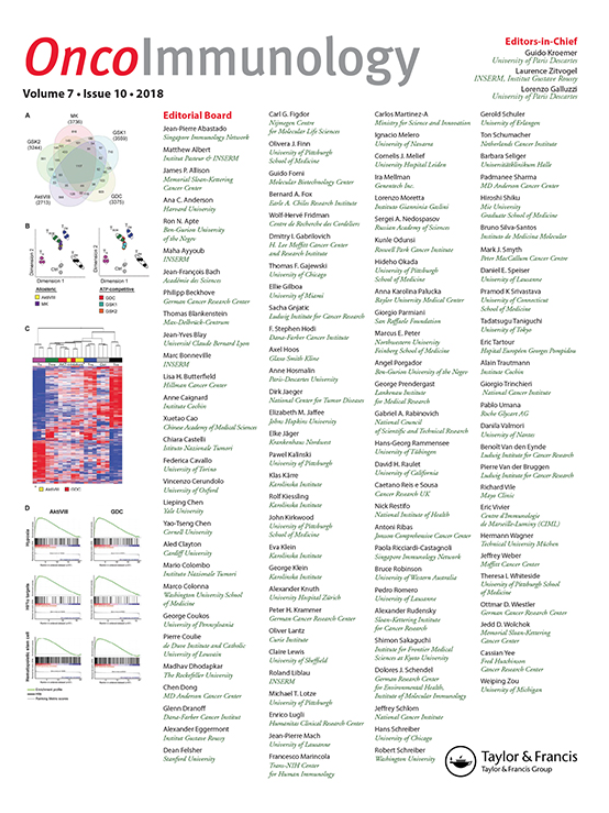Peripheral CX3CR1+ T cells combined with PD-1 blockade therapy potentiates the anti-tumor efficacy for lung cancer
IF 7.2
2区 医学
引用次数: 0
Abstract
ABSTRACT Identifying tumor-relevant T cell subsets in the peripheral blood (PB) has become a potential strategy for cancer treatment. However, the subset of PB that could be used to treat cancer remains poorly defined. Here, we found that the CX3CR1+ T cell subset in the blood of patients with lung cancer exhibited effector properties and had a higher TCR matching ratio with tumor-infiltrating lymphocytes (TILs) compared to CX3CR1− T cells, as determined by paired single-cell RNA and TCR sequencing. Meanwhile, the anti-tumor activities, effector cytokine production, and mitochondrial function were enhanced in CX3CR1+ T cells both in vitro and in vivo. However, in the co-culture system of H322 cells with T cells, the percentages of apoptotic cells and Fas were substantially higher in CX3CR1+ T cells than those in CX3CR1− T cells. Fas-mediated apoptosis was rescued by treatment with an anti-PD-1 antibody. Accordingly, the combination of adoptive transfer of CX3CR1+ T cells and anti-PD-1 treatment considerably decreased Fas expression and improved the survival of lung xenograft mice. Moreover, an increased frequency of CX3CR1+ T cells in the PB correlated with a better response and prolonged survival of patients with lung cancer who received anti-PD-1 therapy. These findings indicate the promising potential of adoptive transfer of peripheral CX3CR1+ T cells as an individual cancer immunotherapy.外周 CX3CR1+ T 细胞与 PD-1 阻断疗法相结合可增强肺癌的抗肿瘤疗效
摘要 鉴别外周血(PB)中与肿瘤相关的 T 细胞亚群已成为一种潜在的癌症治疗策略。然而,可用于治疗癌症的外周血亚群仍然定义不清。在这里,我们发现肺癌患者血液中的 CX3CR1+ T 细胞亚群具有效应特性,与 CX3CR1- T 细胞相比,它们与肿瘤浸润淋巴细胞(TILs)的 TCR 匹配率更高。同时,CX3CR1+ T细胞在体外和体内的抗肿瘤活性、效应细胞因子产生和线粒体功能都得到了增强。然而,在 H322 细胞与 T 细胞的共培养系统中,CX3CR1+ T 细胞的凋亡细胞和 Fas 百分比大大高于 CX3CR1- T 细胞。用抗 PD-1 抗体处理后,Fas 介导的细胞凋亡可被挽救。因此,联合应用 CX3CR1+ T 细胞和抗 PD-1 治疗可显著降低 Fas 表达,提高肺异种移植小鼠的存活率。此外,PB 中 CX3CR1+ T 细胞频率的增加与接受抗 PD-1 治疗的肺癌患者的更好反应和生存期延长相关。这些研究结果表明,外周CX3CR1+ T细胞的采用性转移作为一种个体癌症免疫疗法具有广阔的前景。
本文章由计算机程序翻译,如有差异,请以英文原文为准。
求助全文
约1分钟内获得全文
求助全文
来源期刊

Oncoimmunology
ONCOLOGY-IMMUNOLOGY
CiteScore
12.80
自引率
2.80%
发文量
276
期刊介绍:
Tumor immunology explores the natural and therapy-induced recognition of cancers, along with the complex interplay between oncogenesis, inflammation, and immunosurveillance. In response to recent advancements, a new journal, OncoImmunology, is being launched to specifically address tumor immunology. The field has seen significant progress with the clinical demonstration and FDA approval of anticancer immunotherapies. There's also growing evidence suggesting that many current chemotherapeutic agents rely on immune effectors for their efficacy.
While oncologists have historically utilized chemotherapeutic and radiotherapeutic regimens successfully, they may have unwittingly leveraged the immune system's ability to recognize tumor-specific antigens and control cancer growth. Consequently, immunological biomarkers are increasingly crucial for cancer prognosis and predicting chemotherapy efficacy. There's strong support for combining conventional anticancer therapies with immunotherapies. OncoImmunology will welcome high-profile submissions spanning fundamental, translational, and clinical aspects of tumor immunology, including solid and hematological cancers, inflammation, and both innate and acquired immune responses.
 求助内容:
求助内容: 应助结果提醒方式:
应助结果提醒方式:


